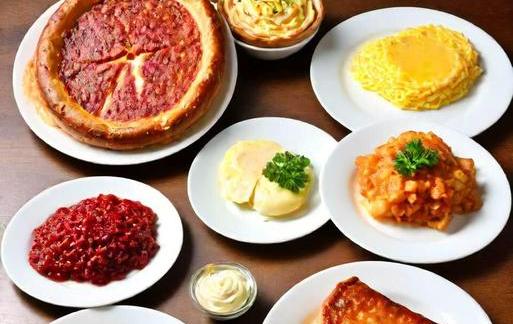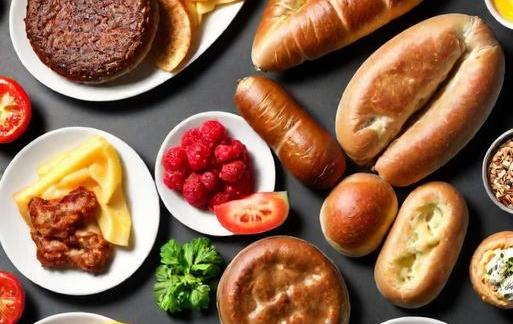- You are here:
- Home »
- Food
- » [REVEALED] German Foods That Start With U
[REVEALED] German Foods That Start With U
Note: This page contains affiliate links.
As an Amazon Associate, I earn from qualifying purchases when you click on the link, but you are not charged extra.
Germany is renowned for its rich culinary heritage, featuring a wide array of delectable dishes that showcase the country’s diverse flavors and regional specialties. In this gastronomic exploration, we delve into German foods that start with the letter “U”. From hearty traditional meals to unique delicacies, this list highlights the lesser-known treasures of German cuisine beginning with the elusive letter “U”. Join us on a culinary journey through the kitchens of Germany, where each dish tells a story of tradition, craftsmanship, and, most importantly, flavor.
Contents
List Of German Foods That Start With U

Uerige Alt
Let’s kick off our culinary journey with a unique German beer, Uerige Alt. Originating from the Uerige Brewery in Düsseldorf, this traditional Altbier (old beer) boasts a rich history dating back to the 19th century. Uerige Alt is characterized by its deep amber color, robust maltiness, and a slightly bitter finish. Locals and beer enthusiasts alike appreciate its distinctive taste, making it a must-try for those exploring German beverages beyond the usual suspects.
Unterländer Bratwurst
A highlight in the realm of German sausages, Unterländer Bratwurst hails from the Unterland region in Baden-Württemberg. What sets this Bratwurst apart is the careful selection of meats, typically a mix of pork and beef, and the unique blend of spices. Often grilled to perfection, Unterländer Bratwurst is celebrated for its juicy texture and well-balanced flavors. Served with mustard and freshly baked bread, it’s a quintessential German street food experience.
Ungarisches Gulasch
While the name might suggest Hungarian origins, Ungarisches Gulasch has firmly secured its place in German cuisine. This hearty stew features tender beef simmered to perfection in a rich, paprika-infused broth. What sets this Gulasch apart is the addition of German beer, adding depth and complexity to the flavor profile. Served with a side of potatoes, noodles, or bread dumplings, Ungarisches Gulasch is a comforting dish that warms both the body and the soul.
Urwaldsuppe
Urwaldsuppe, translating to "jungle soup," is a unique and flavorful soup originating from the German city of Kassel. This soup is a celebration of regional ingredients, featuring wild game such as venison or wild boar, along with an assortment of forest mushrooms. The earthy and robust flavors of Urwaldsuppe make it a favorite during the colder months, offering a taste of the German wilderness in a bowl.
Urwüchsiger Zwiebelkuchen
Venturing into the world of savory pastries, Urwüchsiger Zwiebelkuchen, or rustic onion cake, is a German delicacy often associated with autumn festivities. This savory cake features a yeast-based dough topped with a flavorful mixture of caramelized onions, bacon, and a creamy custard. The result is a savory and satisfying dish that pairs perfectly with a glass of young, fruity wine. Urwüchsiger Zwiebelkuchen exemplifies the German tradition of hearty, comforting baked goods.
Umgedrehter Apfelkuchen
No exploration of German cuisine is complete without a mention of the beloved Apfelkuchen, or apple cake. Umgedrehter Apfelkuchen takes this classic to new heights by adding a delightful twist – it’s an upside-down apple cake. Slices of apples are caramelized at the bottom of the cake pan before being covered with a moist, spiced cake batter. Once baked and inverted, the result is a visually stunning and delicious dessert that captures the essence of fall in every bite.
Unterfränkische Hochzeitsuppe
Stepping into the realm of festive occasions, Unterfränkische Hochzeitsuppe, or Lower Franconian wedding soup, holds a special place in celebratory feasts. This clear broth-based soup is enriched with meatballs, vegetables, and often features the addition of liver dumplings. Served as a starter during weddings and other significant events, Unterfränkische Hochzeitsuppe reflects the German tradition of hearty soups bringing people together in joyous gatherings.
Unbelegtes Brot
In a country renowned for its bread culture, Unbelegtes Brot stands out as a staple. Translating to "untopped bread," this simple yet essential element of German cuisine emphasizes the quality of the bread itself. Germans take great pride in their diverse bread varieties, from dark and hearty Vollkornbrot to light and airy Brötchen. Unbelegtes Brot is a canvas for an array of toppings, from butter and cheese to cold cuts and spreads, showcasing the versatility and artistry of German bakers.
As we conclude our exploration of German foods that start with the letter “U”, we’ve uncovered a diverse tapestry of flavors, textures, and traditions. From iconic beverages like Uerige Alt to comforting stews like Ungarisches Gulasch, each dish tells a unique story rooted in the rich culinary heritage of Germany. Whether you’re a seasoned food enthusiast or a curious explorer, the German cuisine offers a treasure trove of gastronomic delights that continue to captivate taste buds around the world. So, the next time you find yourself seeking culinary inspiration, consider delving into the lesser-explored realm of German foods starting with ‘U’ for a truly authentic and flavorful experience.
Significance
German cuisine is a rich tapestry of flavors and traditions, showcasing a diverse range of dishes that have captivated food enthusiasts around the world. In this exploration of German foods, we delve into a unique perspective – dishes that start with the letter “U”. Unveiling this culinary journey reveals a selection of gastronomic wonders that not only define German food culture but also offer a delightful experience for those with adventurous palates.
The significance of exploring German foods starting with ‘U’ lies in the discovery of lesser-known culinary gems that may not be as prevalent in mainstream discussions about German cuisine. Unearthing these dishes provides an opportunity to appreciate the depth and diversity that characterize the German culinary landscape. Whether you’re a seasoned food connoisseur or a curious novice, delving into these ‘U’-initiated delights promises a journey of flavors and cultural significance.
Category-Related: Unveiling ‘U’-Initiated Culinary Treasures

1. Ulmer Spatz (Ulm Sparrow)
Description: The Ulmer Spatz, or Ulm Sparrow, is a delightful pastry originating from the city of Ulm. This sweet treat is crafted in the shape of a sparrow, paying homage to the city’s emblematic bird. Comprising layers of flaky pastry and a rich almond filling, the Ulmer Spatz is often dusted with powdered sugar, creating a visually appealing dessert that tastes as heavenly as it looks.
Preparation: Bakers meticulously layer thin sheets of dough, interspersing them with a delectable almond paste. The pastry is then baked to golden perfection before being adorned with a dusting of powdered sugar.
Serving Suggestion: Enjoy the Ulmer Spatz with a cup of aromatic coffee or pair it with a dollop of whipped cream for an indulgent treat.
2. Ungarische Langosch (Hungarian Langos)
Description: While the name may suggest Hungarian origins, Ungarische Langosch has found its way into German cuisine with a unique twist. This deep-fried flatbread is a popular street food, known for its crispy exterior and soft interior. Traditionally topped with garlic, sour cream, and cheese, it offers a satisfying blend of textures and flavors.
Preparation: The dough is prepared using flour, water, and yeast, and then left to rise. Once risen, it’s flattened and deep-fried until golden brown. The toppings, including garlic, sour cream, and cheese, are generously applied to create a mouthwatering delight.
Serving Suggestion: Enjoy Ungarische Langosch as a snack or a hearty meal, and feel free to experiment with additional toppings like sautéed mushrooms or cured meats.
3. Ueberbackene Muscheln (Baked Mussels)
Description: Ueberbackene Muscheln, or baked mussels, showcases the German penchant for seafood. This dish features plump mussels baked to perfection with a flavorful breadcrumb and cheese topping. The result is a harmonious marriage of briny sea flavors and the richness of melted cheese.
Preparation: Fresh mussels are cleaned and steamed until they open. The shells are then filled with a breadcrumb mixture seasoned with herbs and spices. A generous layer of cheese crowns the dish, creating a golden, bubbling crust when baked.
Serving Suggestion: Serve Ueberbackene Muscheln as an appetizer or a main course, accompanied by a crisp white wine to complement the seafood flavors.
Common Themes: Unifying Elements In ‘U’-Inspired German Foods
1. Regional Diversity
One common theme among these ‘U’-initiated German foods is the celebration of regional diversity. From the Ulmer Spatz representing the city of Ulm to the Hungarian-inspired Ungarische Langosch, these dishes exemplify how regional influences shape German culinary traditions.
2. Artisanal Craftsmanship
Another recurring theme is the emphasis on artisanal craftsmanship. Whether it’s the meticulous layering of pastry in the Ulmer Spatz or the handcrafted nature of Ueberbackene Muscheln, these dishes reflect the dedication of German chefs and bakers to their craft.
3. Culinary Fusion
Ungarische Langosch, with its Hungarian roots blended seamlessly into German street food culture, exemplifies the culinary fusion often found in German cuisine. The willingness to embrace diverse flavors and techniques contributes to the dynamic nature of German gastronomy.
Interesting Facts: Unraveling The Culinary Tapestry
1. Ulmer Spatz In Festivals
The Ulmer Spatz holds a special place in local festivals in Ulm, where bakeries and confectioneries compete to showcase the most creatively crafted and delicious sparrow-shaped pastries. These festivals celebrate the city’s emblem in a gastronomic extravaganza.
2. Ungarische Langosch Origins
While Ungarische Langosch has Hungarian origins, its incorporation into German street food culture has led to creative adaptations. In various regions, you might find unique toppings and variations that reflect the local culinary preferences.
3. Ueberbackene Muscheln Traditions
Ueberbackene Muscheln has deep-rooted traditions in coastal regions of Germany, where fresh seafood is abundant. Families often gather for special occasions to enjoy this dish, making it a symbol of shared moments and culinary heritage.
Conclusion
In the journey through German foods that start with “U”, we’ve uncovered a fascinating array of flavors, traditions, and cultural significance. From the sweet indulgence of Ulmer Spatz to the savory delight of Ueberbackene Muscheln, each dish tells a unique story of German culinary artistry. The common themes of regional diversity, artisanal craftsmanship, and culinary fusion further emphasize the dynamic nature of German gastronomy.
As we conclude this culinary exploration, it becomes evident that the richness of German cuisine extends far beyond the well-known classics. It thrives in the lesser-explored realms of the culinary alphabet, where each letter reveals a treasure trove of flavors waiting to be savored. So, the next time you find yourself embarking on a culinary adventure, consider starting with ‘U’ to unlock the delectable secrets of German gastronomy.


